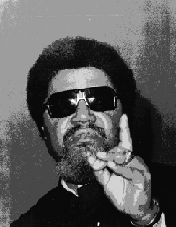
The Robert F. Williams'
Cyber-Memorial Website
|
|
|
|
| |
|
The Robert F. Williams' | |
|
Cyber-Memorial Website | |
|
| |
|
|
Charlotte, North Carolina--On Tuesday, October 22, 1996, more than 300 relatives, friends and community members packed the Central United Methodist Church in Monroe, North Carolina to mourn the death of a great freedom fighter and Black Nationalist Robert F.Williams. Brother Williams died on October 15, 1996 at a Michigan Hospital after a long battle with Hodgkin's Disease. Williams attracted national and international attention when he organized community members to picket and advocated organized protest against the injustices of local officials and armed self-defense against the rascist violence perpetuated by Ku Klux Klan.
As head of the Union County NAACP, he launched lunch-counter sit-ins and protests against racial discrimination throughout the country. Williams felt that the non-violent approach was failing. He urged the African-American community to organize gun clubs and martials arts units as a disciplined way to train and defend themselves against Klan terrorism. Rob was consistant in his vow to defend his community and family at any cost.
In the wake of the 1961 Monroe riot, where civil rights protesters were outnumbered by thousands of whites, Williams had been framed and charged with kidnapping a white couple who was in the wrong place at the wrong time. Williams gave them refuge in his home just before one of many terrorist attacks on Monroe's African American community was about to take place. After truck loads of armed white terrorist were repelled by community self-defense forces, the white couple was allowed to leave and return to their home in the white section of town. Shortly after their return, the couple was persuaded to become part of a rascist plot, charging Williams of kidnapping.
Williams and his wife Mabel and their two sons, John and Franklin, fled in the darkness of night, eventually seeking exile in Cuba for 3 years, where he produced a radio program called "Radio Free Dixie", published the "Crusader" newsletter and authored "Negroes With Guns" (1962), a book about the struggles in Monroe. Williams was the first president of the Republic of New Africa (RNA) while in exile.
After the Birmingham Bombing of the 16th Street Baptist church, which killed four African-American children, while they were attending Sunday school. From Cuba, Rob wrote letters to major world leaders appealing to them to condem the racist terrorist attack. Only one leader responded, Chairman Mao Tse Tung, helmsman of the Chinese Revolution. Shortly after Rob and his family moved to the Peoples Republic of China, where they spent five years in exile. Rob continued to advocate and speak on behalf of the African America struggle internationally.
He and his family returned to the United States in 1969 and fought extradition by Union County from Michigan where he has lived since his return. As for the couple who accused Williams, one died and the the other did not want to continue living a lie. Finally, in 1976, the Union County district attorney dropped charges against Williams.
Twenty years later, in August 1996, Robert F. Williams and his wife were given a hero's welcome as grand marshals during the 10th annual Winchester Avenue high School reunion. Riding in the lead car, the William's motorcade drove through the streets of Monroe as crowds of people came out to thank him for his vision, bravery and contributions to their community.
Tim Tyson, professor at the University of Wisconsin is Robert Williams' biographer. Tyson's doctoral dissertation is entitled "Radio Free Dixie: Robert F. Williams and the Roots of Black Power (Duke University). Tyson is expected to finish a book about Williams' life in 1997.
Aukram Burton, professor at the University of North Carolina at Charlotte is producing a documentary on Robert F. Williams. The documentary will focus on Williams as the premiere contemporary black political voice who advocated armed self-defense by black victims of rascist violence. The documentary will also focus on Robert F. Williams, an African American leader following the continuum of leaders that have spoke on the plight of African and African Americans in the international arena. The deocumentary is scheduled to be completed in early 1998.
The Robert Williams' story is an important chapter in the struggle for self-determination and black liberation. If you or someone you know would like to contribute text and/or images toward building this cyber-memorial for the late Robert F. Williams, please direct all inquiries to:
University of North Carolina at Charlotte
Tel: 1-704-547-4211